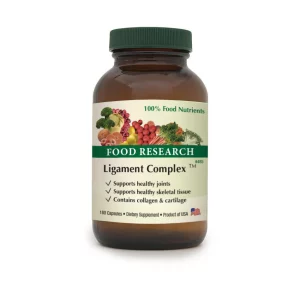Your cart is empty.
 Joint pain isn’t just about age, it could be a sign of overuse or inflammation and it’s a sign your body is asking for help. From what you eat to the supplements you take, every choice matters. And you can support your joints by sticking to foods for joint health.
Joint pain isn’t just about age, it could be a sign of overuse or inflammation and it’s a sign your body is asking for help. From what you eat to the supplements you take, every choice matters. And you can support your joints by sticking to foods for joint health.
Some experts will tell you to add these foods to your diet. But for most people with joint issues, the problem isn’t adding in the foods that help. The problem is eliminating or – at the very least – significantly reducing the foods that cause harm.
Of course it’s best to start with your diet before adding supplementation in. But if you have already added these in or if adding in the amount needed is unrealistic for you – then consider targeted supplementation or other support. (More on that below)
Foods to Support Joint Health
- Omega-3-rich fish (salmon, sardines)
- Colorful berries (blueberries, raspberries)
- Leafy greens (spinach, kale)
- Bone broth for collagen and minerals
Foods to Avoid
- Refined sugar – fuels inflammation
- Processed oils – high in omega-6s, pro-inflammatory
- Alcohol – increases uric acid and joint stress
- Gluten (for sensitive individuals) – may trigger immune reactivity
There are probably no surprises for you about the food list. One of the greatest challenges you might have is getting enough of it in to make a difference.
“To have a clinical result, you need a clinical amount” – and sometimes that amount is far greater than what you can eat. So if you’ve been eating what you are supposed to, then you might need more targeted support.
That’s why this guide also highlights Ligament Complex supplement from Doctors Food Research—a powerful blend of natural ingredients proven to support joints, ligaments, and skeletal tissue. Let’s break it down, piece by piece, so you can nourish your body from the inside out.
Ligament Complex: Its Ingredients and Science
Ligament Complex is a comprehensive blend of 100% food-based nutrients and targeted organ-specific support. Let’s explore each ingredient and its research-backed benefits for joint health:
Core Vitamins & Minerals
- Vitamin A (Beta-carotene) – Supports bone growth and immune health (Mayo Clinic).
- Vitamin C (from Acerola Cherry) – Critical for collagen synthesis and cartilage repair (Mayo Clinic).
- Vitamin D – Helps regulate calcium absorption for strong bones and joints (Johns Hopkins).
- Vitamin E – Antioxidant that protects cells from damage and supports immune function (Mayo Clinic).
- Vitamin B12 (Methylated) – Supports nerve health, energy production, and joint function (Mayo Clinic).
- Calcium – Builds strong bones, essential for joint health (Mayo Clinic).
- Manganese – A co-factor for collagen formation and bone development (Johns Hopkins).
Organ & Tissue-Specific Factors (Bovine Source)
- Adrenal, Bone Marrow, Bone Meal, Cartilage, Collagen Peptides, Cytotrophins (Heart, Kidney, Liver, Spleen) – Provide raw materials and peptides for ligament and joint repair, based on the principle of glandular therapy.
- Natural Carbamide – Aids in nitrogen balance and protein metabolism for tissue rebuilding.
- Ribonucleic Acid (RNA) – Supports cell repair and tissue regeneration.
Plant & Whole-Food Ingredients
- Acerola Cherry (Malpighia Glabra) – A potent source of vitamin C for collagen support.
- Organic Brown Rice, Carrot Root, Flaxseeds, Shiitake Mushroom – Rich in vitamins, minerals, and phytonutrients for anti-inflammatory support.
- Sunflower Lecithin, Wheat Germ, Beet Root, Icelandic Moss, Wheatgrass – Support cellular health, antioxidant function, and tissue healing.
These ingredients work synergistically to nourish ligaments, joints, and connective tissue. Ligament Complex isn’t just a supplement—it’s a targeted, whole-body support system.
👉 Ready to take action? Purchase Ligament Complex here or schedule a free discovery call for personalized guidance.
Quantum Response Testing: Find the Hidden Triggers
Quantum Response Testing helps pinpoint the root causes of joint discomfort by detecting energy imbalances in tissues and organs. This bioenergetic feedback guides personalized care by identifying nutrient deficiencies, food sensitivities, or toxin burdens—insights you won’t get from standard labs.
Labs to Go Deeper: The Power of Functional Testing
Two functional labs stand out for joint health insights:
- GI-MAP by Diagnostic Solutions
Detects pathogens, inflammation, and dysbiosis in the gut, revealing hidden drivers of joint pain. - Vibrant Wellness Hormone Test
Uncovers imbalances like estrogen dominance or adrenal dysfunction that impact inflammation and joint health.
Testing + Quantum Response Testing = a powerful strategy to uncover and address joint health challenges.

RESOURCES
Core Vitamins & Minerals
- Vitamin A (Beta-Carotene)
Mayo Clinic Staff. (n.d.). Vitamin A. Mayo Clinic.
https://www.mayoclinic.org/drugs-supplements-vitamin-a/art-20366216 - Vitamin C (from Acerola Cherry)
Mayo Clinic Staff. (n.d.). Vitamin C. Mayo Clinic.
https://www.mayoclinic.org/drugs-supplements-vitamin-c/art-20363932 - Vitamin D
Johns Hopkins Medicine. (n.d.). The importance of Vitamin D.
https://www.hopkinsmedicine.org/health/wellness-and-prevention/vitamin-d - Vitamin E
Mayo Clinic Staff. (n.d.). Vitamin E. Mayo Clinic.
https://www.mayoclinic.org/drugs-supplements-vitamin-e/art-20364144 - Vitamin B12 (Methylated)
Mayo Clinic Staff. (n.d.). Vitamin B12. Mayo Clinic.
https://www.mayoclinic.org/drugs-supplements-vitamin-b12/art-20363663 - Calcium
Mayo Clinic Staff. (n.d.). Calcium and bone health. Mayo Clinic.
https://www.mayoclinic.org/drugs-supplements-calcium/art-20369935 - Manganese
Johns Hopkins Medicine. (n.d.). Manganese and your bones.
https://www.hopkinsmedicine.org/health/wellness-and-prevention/vitamin-and-mineral-supplements
Glandulars and Tissue-Specific Ingredients
- Glandular Therapy
Dresser, L. (2020). Glandular therapy: History, science, and practice. Nutritional Perspectives.
https://www.ncbi.nlm.nih.gov/pmc/articles/PMC5789212/ - Collagen Peptides for Joint Health
Zdzieblik, D., et al. (2017). Collagen supplementation and joint health: A review. Current Medical Research and Opinion, 33(11), 1–10.
https://pubmed.ncbi.nlm.nih.gov/28829137/
Plant-Based Nutrients
- Acerola Cherry (Vitamin C content)
Chun, O. K., et al. (2007). Vitamin C in health promotion. Nutrients, 9(4), 1–14.
https://www.ncbi.nlm.nih.gov/pmc/articles/PMC6073522/ - Flaxseeds (Anti-inflammatory benefits)
Parikh, M., et al. (2019). Flaxseed consumption and inflammation markers: A systematic review. Nutrition Reviews, 77(9), 665–679.
https://pubmed.ncbi.nlm.nih.gov/31318413/ - Shiitake Mushroom (Beta-glucans & Immune Modulation)
Vetvicka, V., & Vetvickova, J. (2014). Effects of shiitake-derived beta-glucan on immune function. Biomedicine & Pharmacotherapy, 68(5), 575–580.
https://pubmed.ncbi.nlm.nih.gov/25040883/
Stay Healthy!

 Joint pain isn’t just about age, it could be a sign of overuse or inflammation and it’s a sign your body is asking for help. From what you eat to the supplements you take, every choice matters. And you can support your joints by sticking to foods for joint health.
Joint pain isn’t just about age, it could be a sign of overuse or inflammation and it’s a sign your body is asking for help. From what you eat to the supplements you take, every choice matters. And you can support your joints by sticking to foods for joint health.
